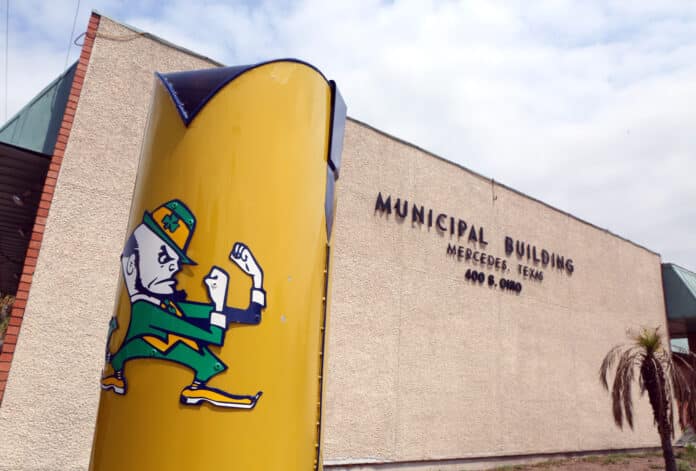
After years in which Mercedes’ financial auditors have repeatedly found that the city was falling short in its recordkeeping, things are finally beginning to turn around.
That was the overarching message certified public accountant Adrian Webb relayed as he delivered his audit findings for fiscal year 2021-22 to the Mercedes City Commission on Tuesday.
“For the opinion, the city received an unmodified opinion, which is the highest that you can receive for a governmental entity,” Webb said at the start of his presentation.
The CPA added that he was confident his conclusions were accurate given the financial documentation supplied by city staffers.
“This opinion really covers that we are comfortable and we know that the numbers that are on the financials are the numbers that the city incurred during the year… (and) that the balance sheets and statement of activities do reflect the city’s activities,” Webb said.
Among the highlights, Mercedes grew its general fund by more than $1 million over the last fiscal year. It also turned its utility fund — which has long remained insolvent — into a revenue-producing fund for the first time in years.
Governmental funds increased by about $3.4 million, but Webb cautioned that the majority of that figure — about $2.2 million — comes from as-yet unused money that Mercedes borrowed last year to fund infrastructure improvements.
“The general fund it’s definitely increasing, but I just want to point out so it’s not misleading the increase of the $3.4 million it’s due to borrowing proceeds,” Webb said.
Nonetheless, removing the loan from the equation, the city’s general fund still saw an increase of about $1.6 million.
As for the utility fund, Mercedes used part of the 2021 bond series to help right the previously upside-down fund.
“The city was subsidizing the utilities from the general fund every year. And this was the first year it was corrected,” Mercedes City Manager Alberto Perez explained.
Between the injection of borrowed cash, as well as a series of rate increases for water and wastewater services, the utility fund has finally become solvent.
“The cash balance for fiscal year 2022 was $600,000. That’s what was left in the utility fund. Last year it was negative $700,000,” close to $800,000, Finance Director Nereida Perez said.
Stabilizing the utility fund allowed Mercedes to correct an issue previous auditors had identified as a problem — the city’s ability to manage its cash.
This was Webb’s first time auditing Mercedes’ finances. For the previous four years, the audits had been conducted by McAllen CPA firm, Burton, McCumber & Longoria, or BML.
Webb referenced BML’s audit findings frequently throughout the course of his presentation, specifically in how the city’s finance department has worked to implement the corrections and controls BML recommended in its audits, such as its finding of deficiencies in Mercedes’ cash management system.
“In this year there’s still a lot of adjustments, but they’re significantly less than the previous year audits, and I think that’s due to staff learning… and implementing those recommendations,” Webb said.
Auditors typically classify their “findings” — a term of art for their professional opinions on a client’s accounting practices — as deficiencies.
Those deficiencies are further broken down by severity — a significant deficiency or a material weakness.
Material weaknesses are considered more serious — errors or flawed accounting practices that could lead to a “material misstatement of the entity’s financial statements” that might not be prevented or detected, according to a definition provided within Webb’s 117-page audit report.
Of the seven material weaknesses identified by BML in its 2020-21 fiscal audit, five had been corrected or partially corrected by the time Webb sat down with Mercedes’ books.
“They changed from ‘material deficiencies’ to ‘significant,’ is that correct? They’re headed in the right direction?” Place 4 Commissioner Ruben Saldaña asked.
Webb replied in the affirmative, but added that more work needs to be done.
One of the other major funds whose accounting staff worked hard to correct was the EMS fund.
Webb noted that BML’s recommendations to correct the EMS fund had been implemented by city staff in the span between BML’s audit and his.
“Thank God for that. Our EMS took a lot of beating over nonsense, so I’m glad that got corrected,” Place 3 Commissioner Joe Martinez said.
Seemingly a non sequitur, the commissioner’s comment hearkened back to the tense discussions that often plagued the commission in the past.
Indeed, without ever once mentioning their names, much of Tuesday night’s comments seemed to be a direct refutation of the heavy criticisms former commissioners Leonel Benavidez and Jose Gomez lobbed during their tenures on the commission.
This May, Martinez and Benavidez will face off at the ballot box as the pair vie for the Place 3 seat along with another former public official, Leandro “Leo” Villarreal.
The EMS fund, in particular, was often the subject of Benavidez and Gomez’s scrutiny.
The pair often made thinly veiled allegations of fiscal mismanagement and wrongdoing.
It was a stigma Place 1 Commissioner Jacob Howell addressed directly.
“Out of what you reviewed, was there any fraudulent — anything you found there — that raises a red flag?” Howell asked Webb.
The accountant replied that sample testing hadn’t revealed anything nefarious, but qualified his response with a note of caution.
“When it comes to fraud, if there’s not somebody that comes and speaks up about something, it’s usually hard to determine in a financial audit,” Webb said.



